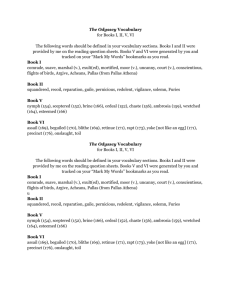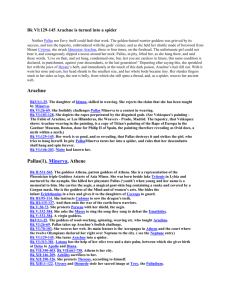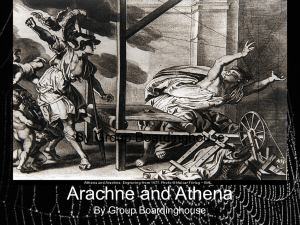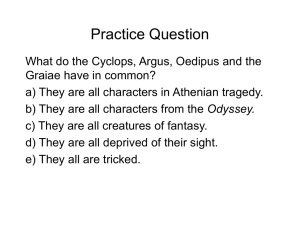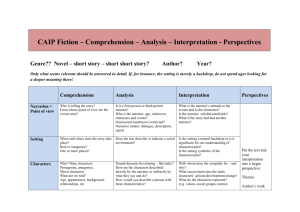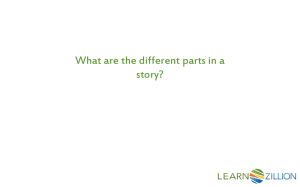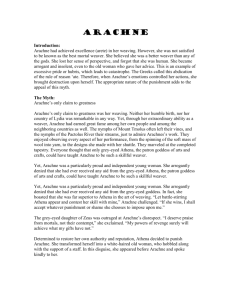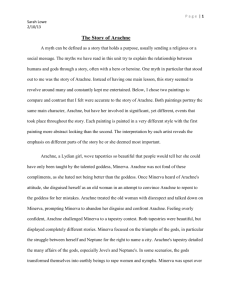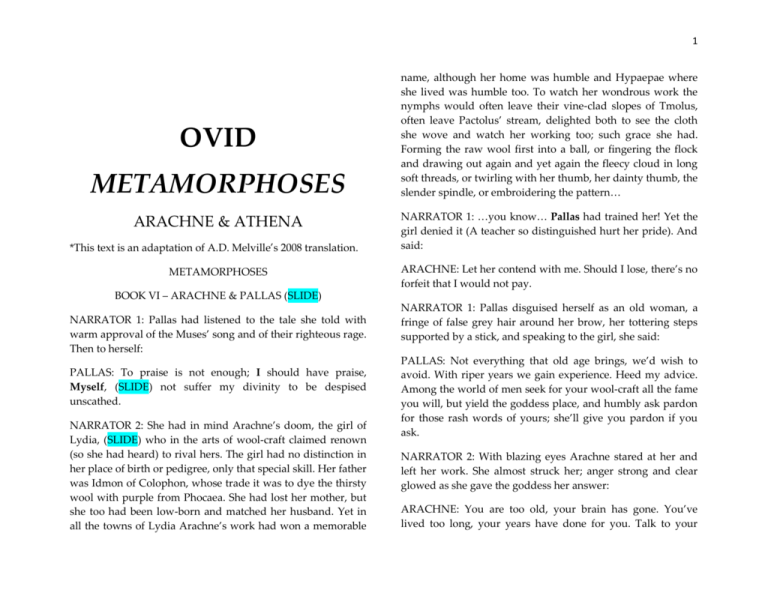
1
OVID
METAMORPHOSES
ARACHNE & ATHENA
*This text is an adaptation of A.D. Melville’s 2008 translation.
METAMORPHOSES
name, although her home was humble and Hypaepae where
she lived was humble too. To watch her wondrous work the
nymphs would often leave their vine-clad slopes of Tmolus,
often leave Pactolus’ stream, delighted both to see the cloth
she wove and watch her working too; such grace she had.
Forming the raw wool first into a ball, or fingering the flock
and drawing out again and yet again the fleecy cloud in long
soft threads, or twirling with her thumb, her dainty thumb, the
slender spindle, or embroidering the pattern…
NARRATOR 1: …you know… Pallas had trained her! Yet the
girl denied it (A teacher so distinguished hurt her pride). And
said:
ARACHNE: Let her contend with me. Should I lose, there’s no
forfeit that I would not pay.
BOOK VI – ARACHNE & PALLAS (SLIDE)
NARRATOR 1: Pallas had listened to the tale she told with
warm approval of the Muses’ song and of their righteous rage.
Then to herself:
PALLAS: To praise is not enough; I should have praise,
Myself, (SLIDE) not suffer my divinity to be despised
unscathed.
NARRATOR 2: She had in mind Arachne’s doom, the girl of
Lydia, (SLIDE) who in the arts of wool-craft claimed renown
(so she had heard) to rival hers. The girl had no distinction in
her place of birth or pedigree, only that special skill. Her father
was Idmon of Colophon, whose trade it was to dye the thirsty
wool with purple from Phocaea. She had lost her mother, but
she too had been low-born and matched her husband. Yet in
all the towns of Lydia Arachne’s work had won a memorable
NARRATOR 1: Pallas disguised herself as an old woman, a
fringe of false grey hair around her brow, her tottering steps
supported by a stick, and speaking to the girl, she said:
PALLAS: Not everything that old age brings, we’d wish to
avoid. With riper years we gain experience. Heed my advice.
Among the world of men seek for your wool-craft all the fame
you will, but yield the goddess place, and humbly ask pardon
for those rash words of yours; she’ll give you pardon if you
ask.
NARRATOR 2: With blazing eyes Arachne stared at her and
left her work. She almost struck her; anger strong and clear
glowed as she gave the goddess her answer:
ARACHNE: You are too old, your brain has gone. You’ve
lived too long, your years have done for you. Talk to your
2
daughters, talk to your sons’ wives! My own advice is all I
need. Don’t think your words have any weight. My mind’s
unchanged. Why doesn’t Pallas come herself? Why should she
hesitate to match herself with me?
NARRATOR 1: Then Pallas said:
PALLAS: She is already here!
NARRATOR 2: …and threw aside the old crone’s guise and
stood revealed. The nymphs and Lydian women knelt in
reverence. Only Arachne had no fear. Yet she blushed all the
same; a sudden colour tinged her cheeks against her will, then
disappeared; so when Aurora rises in the dawn, the eastern
sky is red, and as the Sun climbs, in a little while is pale again.
She stood by her resolve, to setting her heart…
NARRATOR 1: …her STUPID heart, on victory, and rushed to
meet her fate. Nor did the child of Jove refuse or warn her
further or postpone the contest. (STAND APART) Then, with
no delay, they both, standing apart, set up their separate
looms and stretched the slender warp. The warp is tied to the
wide cross-beam; a cane divides the threads; the pointed
shuttles carry the woof through, sped by their fingers. When
it’s through the warp, the comb’s teeth, tapping, press into
place. Both work in haste, their dresses girdle tight below their
breasts; the movements of their arms are skilled and sure; their
zeal beguiles their toil.
NARRATOR 2: Here purple threads that Tyrian vats have
dyed are woven in, and subtle delicate tints that change
insensibly from shade to shade. So when the sunshine strikes a
shower of rain, the bow’s huge arc will paint the whole wide
sky, and countless different colours shine, yet each gradation
dupes the gaze, the tints that touch so similar, the extremes so
far distinct. Threads too of golden wire were woven in, and on
the loom an ancient tale was traced.
PALLAS: The rock of Mars in Cecrops’ citadel, is MY picture
(SLIDE) and that old dispute about the name of Athens.
Twelve great gods, Jove in their midst, sit there on lofty
thrones grave and august, each pictured with own familiar
features: Jove in regal grace, the Sea-god standing, striking the
rough rock with his tall trident, and the wounded rock
gushing sea-brine, his proof to clinch his claim. But I myself
give a shield, I give a spear, sharp-tied, I give a helmet for my
head. The aegis guards my breast and from the earth, struck
by my spear, I show an olive tree, springing pale-green with
berries on the boughs; (ASSERTIVE) the gods admire and
Victory ends the work.
ARACHNE: You want to see Victory? I’ll show you
Victory…this is Europa (SLIDE) cheated by the bull’s disguise,
a real bull you’d think, and real sea. The girl was gazing at the
shore she’d left and calling to her friends, seeming to dread
the leaping billows’ touch, shrinking and drawing up her feet
in fear. Take that!
PALLAS: Shall I provide some examples to instruct my rival
what reward she should expect for her hubristic daring? I will
design in each of the four corners four small scenes of contest,
brightly coloured miniatures. There in one corner Thracian
Rhodope and Haemon, (SLIDE) icy mountains now, but once
mortals, who claimed the names of gods most high.
3
ARACHNE: (INTERRUPT) Why not weave Asterie in the
struggling eagle’s clutch and also picture Leda (SLIDE) as she
lay under the white swan’s wings…
PALLAS: Look at the Pygmy matron’s doom, Queen Gerana’s
miserable doom, when Juno won the contest and transformed
her to a crane and made her fight her folk, her kith and kin.
ARACHNE: And watch me add how Jove raped all those
women: 1. (SLIDE) once in a satyr’s guise he had got Antiope
with twins 2. (SLIDE) as Amphitryon, bedded Alcmena 3.
(SLIDE) in a golden shower he fooled Danae 4. (SLIDE) the
same with Aegina in a flame 5. (SLIDE) as a shepherd he
snared Mnemosyne 6. (SLIDE) as a spotted serpent he went
after Proserpine and 7… (INTERRUPT)
PALLAS: I will picture Antigone too, who once challenged the
royal consort of great Jove. And Juno changed her to a bird,
and Troy availed her nothing nor Laomedon, her father – no!
with snowy feathers clothed, in self-applause she claps her
stork’s loud bill.
ARACHNE: And should I weave another divine adulterer,
your uncle Neptune who changed to a savage bull for love of
Canace; and again he sired, as Enipeus, the Aloidae; Bisaltes’
child Theophane (SLIDE) he cheated as a ram; the corn’s most
gracious mother Ceres, (SLIDE) golden-haired suffered him as
a horse, and, as a bird, the snake-tressed mother Medusa
(SLIDE) of the flying steed; and poor Melantho knew him as a
dolphin.
NARRATOR 2: To all of them Arachne gave their own
features and proper features of the scene.
PALLAS: In the last corner I will show Cinyras, (SLIDE)
bereaved, embracing the temple steps, his daughter’s limbs,
and lying on the marble seemed to weep. All round the border
ran an olive-branch, the branch of peace. That was the end.
And I shall finish my picture with my own fair tree.
ARACHNE: Oh please don’t give an end to our competition. I
have got more rapists to weave: Phoebus in a herdsman’s
guise or in a lion’s skin, or sometimes hawk’s plumage; he
fooled Isse, (SLIDE) Macareus’ daughter, as a shepherd.
Bacchus with bunches of false grapes deceived Erigone,
(SLIDE) and Saturn, as a horse, begot the centaur Chiron.
(SLIDE) Round the edge a narrow band of flowers I design,
flowers and clinging ivy intertwined.
NARRATOR 1: In all that work of hers Pallas could find, Envy
could find, no fault. Incensed at such success the warrior
goddess, golden-haired, tore up the tapestry, those crimes of
heaven, and with the boxwood shuttle in her hand (Box of
Cytorus) three times, four times, struck Arachne on her
forehead. (SLIDE)
NARRATOR 2: The poor wretch. Unable to endure it, bravely
placed a noose around her neck; but as she hung, Pallas in pity
raised her…
PALLAS: Live! Yes live, but hang, you wicked girl, and know
you’ll rue the future too: that penalty your kin shall pay to all
posterity!
NARRATOR 1: And as she turned to go, she sprinkled her
with drugs of Hekate and in a trice, touched by the bitter
lotion, all her hair falls off and with it go her nose and ears.
Her head shrinks tiny; her whole body’s small; instead of legs
4
slim fingers line her sides. The rest is belly; yet from that she
sends a fine-spun thread and, as a spider, still weaving her
web, pursues her former skill.
he focused on continuing identity and the
psychological interest of metamorphosis.
5. Interesting idea by Frankel: DISCUSS this: Ovid was
NOTES
attracted to the theme of metamorphosis because it is
1. Genres: What different genres can we identify?
a. Philosophico-didactic allusions
b. Epic
c. Tragedy
d. Elegy
e. Pastoral poetry
2. Typical Ovidian metamorphosis: a single, irreversible
change from one state to another The central
principle of Ovid’s narrative: CHANGE
3. The psychological aspects of METAMORPHOSIS: it
has to do with CHANGE and change from one state of
being into another links similar things. Hence, the state
AFTER the change has similarities with the state
BEFORE > at the same time there is depiction of human
emotions (sometimes antithetical).
4. Ovid was not a philosopher but he knew that the
metamorphosis theme has been treated philosophically
an untragic alternative to death > MY SUGGESTION:
could we say that the poet transforms into his work?
That Ovid beats death because he transforms into his
poetry?
6. Parody of heroic battle: deconstruction of the heroic
code > military power, ancestral pride and genealogy
and immortality K. Galinsky: “Ovid panders to the
tastes
of
his
Roman
public
debased
by
the
contemporary savage pleasures of the amphitheatre
rather than the battlefield”.
7. Use of absurd and grotesque to remind the reader of
the fragility of the human body and the instability
(rather than immortality of the human identity.
8. Femininity in the Metamorphoses: the epic hero is
measured against the prominent presence of women
women challenge the traditional epic values here we
have 2 women competing each other over weaving
which is typically feminine work in epic(>anti-heroic?)
5
9. Conventional notions of feminity are challenged as
13. Book 6: Weaving as a form of writing daring and
passive, modest, domestic; Ovid gives extraordinary
dangerous form of artistic communication > the
play to female voice > not all women are sexual victims
tapestries of Arachne and Minerva have been
and many of them have complex sexual relationships
interpreted as metapoetic paradigms for Ovid’s own
10. Sharrock: “Ovid’s work gives space to a female voice,
work works through their reception from the
in however problematic a manner, and to both female
readers can escape the authoritarian forces that try to
and male voices which reflect explicitly to their own
destroy them.
gendered identity”.
11. New type of hero: the artist-hero who can be either a
man or a woman the artist challenges conventional
14. The gods: Ovid’s gods raise ethical and political
problems from the very start > imperial cult of
apotheosis.
structures of power though often failing > artists
15. Sexual violence: it is the province of the gods > see
challenge the gods are punished for their audacity (but
Arachne’s examples about the transformations of the
Ovid seems to like this challenge) > Example: Arachne
gods with sexual motive.
ideology of producers of texts > problematic
relationship between artists and power.
12. Identification of Ovid with these artists: status of the
artist and the work of art > aristeia of the hero is
16. Gods – humans – nature: this distinction collapses
the gods in love are reduced to comically human
dimensions
their
anthropomorphic
behaviour
invites the reader to judge them by human standards.
translated into that of the artist despite failure in his
17. Landscape: it is important because it is the amatory
struggle with powerful forces which censor artistic
playground of the gods >dangerous for the humans
autonomy and attempt to constrain him, the artist
who because of the beautiful landscape they are lured
manages to create something great.
into a sense of safety and hence raped or transformed
6
by gods readers also seduced by this natural
landscape and become complicit with the gods’ desire.

